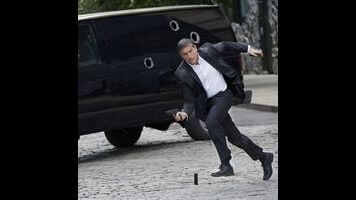Person Of Interest: “Pretenders”

“Pretenders” is a letdown after the brilliance of last week’s episode. Person Of Interest is especially adept at exploring conflicting ideologies, such as the ones maintained by advocates and critics of national security measures or artificial intelligence. The debates between Finch and Root regarding faith and science are some of the highlights of the series. “Pretenders” hints at promising conflicts to come, but only skims the surface in favor of familiar territory.
Marvel must have known that “Pretenders” was going to air today, as it chose this date to announce its upcoming slate of superhero movies. The case of the week does involve an interesting dichotomy—the one between superhero and fan, actor and reactor—but this is a familiar one in the age of superhero media dominance, and “Pretenders” doesn’t expound on these ideas in a compelling way. The number of the week is an insurance salesman cooped up in an office, seeking excitement and companionship by playing detective at night. Unlike the well-trained members of Team Machine, his skills don’t translate to crime-fighting; Walter seeks purpose and attention by posing as a police officer anyways in order to solve a fishy suicide case involving his attractive officemate’s brother.
Subtext becomes text in this meta episode, where a fanboy gets to interact with his superhero, Reese a.k.a. the Man in the Suit. One of Person Of Interest’s strengths is its ability to dabble in several different genres, but this episode lays on the superhero trope references and self-awareness too thickly. Person Of Interest already alludes to superhero tropes regularly in order to explore the relatively fresh subject matter—like artificial intelligence and national security—that set it apart in the current television landscape. Here, the idea of an average person finding empowerment by emulating a superhero is not new, and this episode doesn’t find a way to reanimate this tired plot. Person Of Interest fans don’t need a new character to remind them that Reese and his team are badasses. Parallels are drawn to the team members’ superhero-like lifestyles, which are more about necessity than thrill-seeking, but they seem shallow without more insight into the psychology of Walter or the subjects of his admiration.
Heavy-handed, redundant references to the superhero genre and spoon feedings of fan service don’t give viewers enough credit. The name that Walter chooses for his alter ego—Detective Jack Forge—is hilarious, but this episode’s humor is too broad. Series have to exercise caution when incorporating meta humor and plots into their narratives, because it’s easy to shatter the illusion the writers have expended so much effort into crafting for the sake of self-indulgence. Used sparingly or cleverly, a meta approach can enrich a series, but “Pretenders” doesn’t justify its application.
“Pretenders” introduces promising new conflicts to the season, but they are relegated to the background in favor of the lackluster case of the week, which involves smuggling, a weak twist, and little else. At a Hong Kong academic conference, an interesting dichotomy regarding technology is set up between Finch—an advocate of caution, based on his experiences with artificial intelligence—and Beth Bridges—a proponent of innovation—but their respective stances aren’t explored in enough depth. Even in their infancy, conflicts require more than a couple of exchanges and a random reference to Machiavelli to be meaningful. At least the pretending theme is reappears here, when it seems that Finch is also trying on a different mask, that of the action hero while Shaw takes over his position at the computer desk. Instead, he’s merely using his brainpower like usual, planting something on Ms. Bridge’s computer because of her connection to Samaritan. Team Machine may seem glamorous to someone like Walter, but Finch’s work is too important to allow him to be distracted by the ladies.
While the Samaritan plot inches forward with the revelation of the contents of Ms. Bridge’s laptop, the rivalry between Elias’ mob and the Brotherhood is established. It turns out that both Elias and the Brotherhood are involved in the smuggling of weaponry. The war over territory between the two has a lot of potential, potential that’s only hinted at with a weak river metaphor. As a more traditional mobster, it should be interesting to see how Elias’ organized approached to crime conflicts with Dominic’s nihilism. The episode moves several plots forward, but it would take a much more efficient script to deliver a case of the week and this much setup elegantly.
Stray observations:
· There’s something about the combination of Shaw and cubicles that’s inherently hilarious.
· Mobsters seem to have similar tastes in meeting places. Or maybe I’m missing The Sopranos more than I thought that I was.